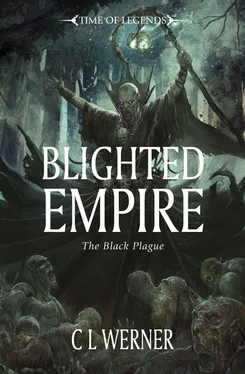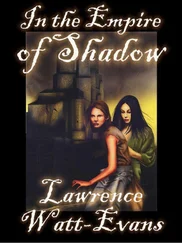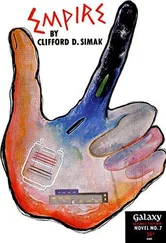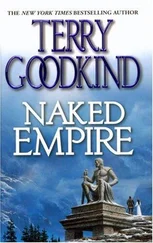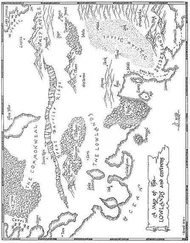C. Werner - Blighted Empire
Здесь есть возможность читать онлайн «C. Werner - Blighted Empire» весь текст электронной книги совершенно бесплатно (целиком полную версию без сокращений). В некоторых случаях можно слушать аудио, скачать через торрент в формате fb2 и присутствует краткое содержание. Год выпуска: 2013, ISBN: 2013, Издательство: Games Workshop, Жанр: Фэнтези, на английском языке. Описание произведения, (предисловие) а так же отзывы посетителей доступны на портале библиотеки ЛибКат.
- Название:Blighted Empire
- Автор:
- Издательство:Games Workshop
- Жанр:
- Год:2013
- ISBN:9781849703116
- Рейтинг книги:3 / 5. Голосов: 1
-
Избранное:Добавить в избранное
- Отзывы:
-
Ваша оценка:
- 60
- 1
- 2
- 3
- 4
- 5
Blighted Empire: краткое содержание, описание и аннотация
Предлагаем к чтению аннотацию, описание, краткое содержание или предисловие (зависит от того, что написал сам автор книги «Blighted Empire»). Если вы не нашли необходимую информацию о книге — напишите в комментариях, мы постараемся отыскать её.
Blighted Empire — читать онлайн бесплатно полную книгу (весь текст) целиком
Ниже представлен текст книги, разбитый по страницам. Система сохранения места последней прочитанной страницы, позволяет с удобством читать онлайн бесплатно книгу «Blighted Empire», без необходимости каждый раз заново искать на чём Вы остановились. Поставьте закладку, и сможете в любой момент перейти на страницу, на которой закончили чтение.
Интервал:
Закладка:
They were deserted now, those villages. Devastated by the cataclysm that had struck Sylvania, the disaster the simple peasants were calling ‘Starfall’. The night sky had, for a terrifying moment, become ablaze with eerie green lights, an uncountable multitude of ghoulish flames that winked down from the heavens. The length and breadth of Sylvania had been pelted with noxious green-black stones, the toxic embers of those ghoul-fires. The whole of the land had been afflicted by the dark sending: crops smashed flat, pastures poisoned, creeks turned foul with glowing scum, homes enflamed as the smouldering stones crashed through thatch roofs.
Nowhere had the destruction been greater than at Drakenhof. Elsewhere, the Starfall had consisted of tiny rocks, seldom bigger than a man’s hand. Drakenhof had proved the exception. Here the stones had been far larger. In one village the mill had been obliterated by a rock the size of an ox-cart, in another a watchtower had collapsed under the impact of a stone bigger than a warhorse. Even these star-sent missiles were insignificant beside the stone that had ploughed through the face of Castle Drakenhof to embed itself in the very heart of the Drakenfelsen, the great rock upon which the fortress stood. With grim humour, some of Malbork’s courtiers had christened the stone ‘the Jewel of Morrslieb’ after a superstitious rumour that it had been flung down at the castle by an angry moon.
The count took small amusement from such prattle. Several of those aristocratic jesters were even now labouring alongside the conscripted inhabitants of the stricken villages, working to clear away the rubble and repair the damage inflicted upon the castle by their ‘moon-stone’. It was hard, unrelenting and dangerous work. A relay of corpse-carts made a constant circuit of the Drakenfelsen, retrieving the corpses overseers tossed from the broken battlements. Fires yet burned unchecked in some of the galleries, and falling debris had turned some of the lower vaults into veritable ovens. Poisonous dust waited wherever the ‘Jewel’ had scraped the walls and floors. Unstable halls were prone to collapse, spilling tons of stone and masonry upon the peasants desperately trying to shore them up. To all of these had to be added the biting cold of the Drakenhoehenzug, the mountain winds whistling through the broken fortress like hungry wolves.
And above all the rest, there was the Black Plague. It cut down the workers by the bushel despite the best efforts of Malbork’s Nachtsheer to dispose of the sick as soon as they were discovered by the soldiers. The disease was unforgiving and insatiable, slaughtering the workers by the hundreds. The count was only thankful that it confined its depredations to men rather than more valuable things like horses and oxen. Even so, the mortality of his workers was becoming tiresome.
Staring up at the castle from his camp on the other side of the River Draken, Malbork frowned as he watched a peasant slip from the scaffolding that framed one of the towers. For an instant, the man clung to one of the gargoyles glowering from the edges of the tower’s sharply angled roof, then he lost his grip on the statue and went plummeting to his doom. It would take a judicious amount of whip-work to get more labourers into the tower after this accident. Malbork didn’t mind the violence, but peasants were less efficient after a beating.
He could almost find it in himself to envy that rebel maniac rampaging across the heart of the county. Some crazed priest unable to cope with the plague. The man had turned to black magic, and wielding such profane power he’d started drawing the dead from their tombs, creating an army of skeletons and corpses. By all reports, the madman’s legion was unstoppable, tireless and unquestioning. They marched across the heaviest snow, through the darkest forest, into the most pestilential marsh in obedience to their master’s murderous whims. With workers like that, Malbork would have Castle Drakenhof rebuilt in a month. Why, with an army like that he would deny his oaths to Stirland and make Sylvania a province in its own right, answerable to none save the Emperor — and perhaps not even him!
The smell of blood intruded upon the count’s daydreams. Irritably, he turned his gaze from the castle to regard the piggish Clucer Scarlat. The foppish courtier was holding a pomander under his nose, taking deep breaths to inundate his lungs with sweet-smelling air. Scarlat, like many of the boiers of Sylvania, subscribed to the theory that the plague was brought about by foul vapours and the surest defence against them was a healthy regime of pungent perfumes. It was a theory Malbork held in as much contempt as he did the peasant belief that the disease represented the punishment of the gods.
Irritably, Malbork snapped his fingers at Scarlat, motioning for the clucer to drop the pomander. Other courtiers hurriedly followed the clucer’s example, fear of their count far outweighing even their fear of the plague. ‘I believe I smell his grace,’ Malbork stated, not without some condescension in his tone. ‘Go and admit the prayer-peddler into our presence.’
Clucer Scarlat grimaced, but bobbed his head and scrambled down the slope. As a precaution, Count Malbork’s tent had been pitched behind a timber palisade, putting a wall between his personage and any sick enemies who might seek to deliberately infect him. He’d dispatched too many plague-ridden messengers to the grand duke’s court in Stirland to allow himself to be victimised by his own strategy.
The clucer returned presently, leading not one but two men. Malbork was mildly surprised to see the armoured figure of Dregator Petru Mihnea. The man was supposed to be leading a Nachtsheer expedition into the Haunted Hills to round up the peasants that had escaped there from their fiefs. Fear of the plague had stirred up a great many curious ideas in the heads of peasants, not the least of which was giving survival precedence over their obligations to the boiers who owned them.
The other man with Scarlat was no surprise at all. The stink of blood announced him as loudly as any crier. Armand Caranica, Arch-Druid of the Blood Circle, high priest of Ahalt the Drinker. The druid’s black robes stank of blood and death. The sickle tucked into the rope belt about his waist was stained with gore, for one of the strictures of his faith was that sacrificial blood was holy and must never be washed away. Armand’s face was lost behind the deer-skull mask he wore, only his thin lips and tapered jaw projecting beneath the yellowed teeth of the mask. From behind the sockets of the skull, fanatical eyes gleamed.
‘The plague still decimates my peasants,’ Malbork growled at the druid before he could finish bowing before him. ‘You promised me that this sort of thing was going to stop.’
Armand leaned upon his oaken staff, hands clenched tight. ‘The might of Ahalt flows through the sacred tree,’ he said in a confident tone. ‘Very soon the tree shall grow strong enough to shield the whole of the castle from the plague.’
‘That doesn’t do me any good here,’ Malbork said, waving his hand to indicate the camp. ‘Maybe you could conjure up a sacred shrubbery to protect me while I’m on this side of the river? Just to bide the time while we wait for the tree to take root.’
A bit of the fanatic gleam left the eyes behind the deer-skull. ‘Your… your excellency must allow the great god time to work his beneficence. Even Mighty Ahalt doesn’t-’
The count raised his hand, cutting off the druid’s explanation. ‘I am no credulous supplicant coming to you on bended knee, Caranica. I am Count von Drak! Everything in this land belongs to me, right down to the robes you wear and the prayers you mutter!’ He rose from his chair, stalking out from the shadow of the tent. Without turning around, he pointed over his shoulder, indicating a long line of stakes flanking his tent. ‘Others have made the mistake of trying to exploit religious gullibility.’ Malbork smiled as he saw Armand’s eyes dart towards the bodies impaled upon those stakes, bodies that still wore the tattered rags of Sigmarite, Shallyan and Morrite clergy. One corpse, arrayed in the leather and furs of a priest of Taal, was still fresh enough that a pair of ravens were pecking at it.
Читать дальшеИнтервал:
Закладка:
Похожие книги на «Blighted Empire»
Представляем Вашему вниманию похожие книги на «Blighted Empire» списком для выбора. Мы отобрали схожую по названию и смыслу литературу в надежде предоставить читателям больше вариантов отыскать новые, интересные, ещё непрочитанные произведения.
Обсуждение, отзывы о книге «Blighted Empire» и просто собственные мнения читателей. Оставьте ваши комментарии, напишите, что Вы думаете о произведении, его смысле или главных героях. Укажите что конкретно понравилось, а что нет, и почему Вы так считаете.
